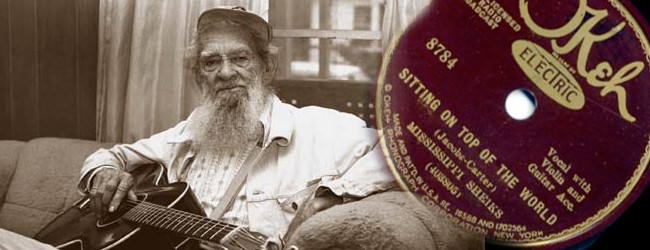 Today we’re bringing you another entry in American Blues Scene’s exclusive “Brief History of a Song” series.
Today we’re bringing you another entry in American Blues Scene’s exclusive “Brief History of a Song” series.
Eighty four years ago today, OKeh Records released The Mississippi Sheiks’ “Sitting on Top of the World,” a song that would become one of the most impactful and well-known in music, crystalizing The Mississippi Sheiks’ powerful contribution to dozens of genres and styles of popular music. A deceptively simple and lucid blues song, it became the Sheiks’ landmark achievement in a brilliant career in the early music industry. Though over eight decades have passed since the song’s release, it’s time and again proven it’s staying power in contemporary music.
The track’s elegance is derived from it’s sparsity, with the Sheiks’ original version containing nothing more than an acoustic guitar doubling as rhythm and percussion, Walter Vinson’s timeless, smokey vocals, and a fiddle, courtesy of Lonnie Chatmon, that weaves through the song, harmonizing with the lyrics, suggesting both a haunting backup vocal and the iconic southern sounds of the country. The simplicity and appeal of the lyrics and the ambiguity of the sound gave it a universal appeal across genres; being recorded in, among others, blues, bluegrass, country, and eventually, even hard rock.
The Mississippi Sheiks were one of the most interesting bands in the 20th century. Their music became some of the earliest popular tracks as records became common in homes. The Sheiks’ lineup was a fluid and revolving group, depending on who was available, that included Walter Vinson, Lonnie and Sam Chatmon, Bo Carter, also the Chatmon’s brother, and Charlie McCoy. The group lived around Jackson, Mississippi and when they weren’t making music, they farmed.
The Chatmon’s father, Henderson, was a former slave and what Sam called a “musicianer”, a man well-known for his musical abilities. The patriarch of the family taught his children to play. “My daddy used to play on the porch,” Chatmon told folklorist Alan Lomax in his film, American Patchwork. “We’d be in the house playing and one of us make like a mistake, made a mistake playing, and he’d tell us ‘bring that fiddle boy, you didn’t play that right’, so he could play it for us.”
The group recorded over sixty songs in the 1930s, including “I’ve got Blood in my Eyes for You”, “Bootlegger’s Blues”, “Things About Comin’ My Way”, “The World is Going Wrong” which was covered by Bob Dylan. They eventually dispersed, partially from effects of the Great Depression, and most members of the family simply returned to farming in Mississippi as they always had. Bo Carter continued a successful solo career, having recorded the original version of the popular “Corrina, Corrina”.
Two years after the original release, Big Bill Broonzy covered the song, as did a number of other performers, including early blues legend Charley Patton. Around that time, country and western swing pioneer Milton Brown covered the track, which lead to it’s widespread popularity in Country music.
Almost thirty years after it’s original release, Howlin’ Wolf recorded one of the most famous blues versions of the song in history on Chess Records. His wailing harmonica and Hosea Lee Kennard’s genius piano playing gave the song an impactful new life.
In 1967, The Grateful Dead’s self-titled debut album included a country-infused, upbeat version of the track. One year later, Cream, continuing to pay homage to their biggest influences, recorded a famous version of the song for their Wheels of Fire album.
In 2003, rocker Jack White of The White Stripes covered the song for the movie Cold Mountain. In the vein of the original, the fiddle loosely mimicking playing backup. In 2008, White was featured prominently playing “Sittin'” on piano in the powerful documentary, It Might Get Loud. And in 2009, Black Hen Music released Things About Comin’ My Way – A Tribute to the Mississippi Sheiks featuring the North Mississippi Allstars, John Hammond, Ndidi Onukwulu, and the Carolina Chocolate Drops singing covers of Sheiks songs.
“Was all the summer and all the fall, just trying to find my little Lenore. But now she’s gone, I don’t worry… I’m sitting on top of the world,” sang Vinson, who’s lyrics, along with the Sheiks’ song, would be re-recorded hundreds of times for decades to come. In 2008, the song was inducted into the Grammy Hall of Fame, acknowledging the staying power and widespread cultural and musical impact the song continues to enjoy. For eighty four years, the impact of a former slave and his family of farmers can continue to be felt in every day music.
Sam Chatmon – “Sitting on Top of the World”


